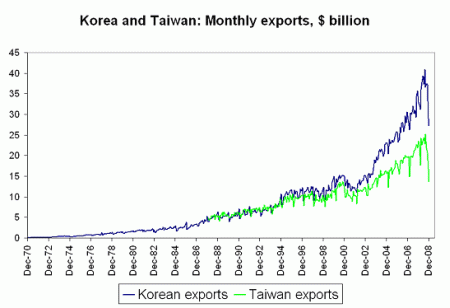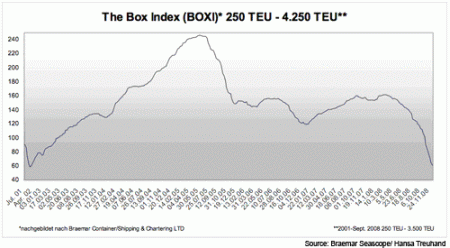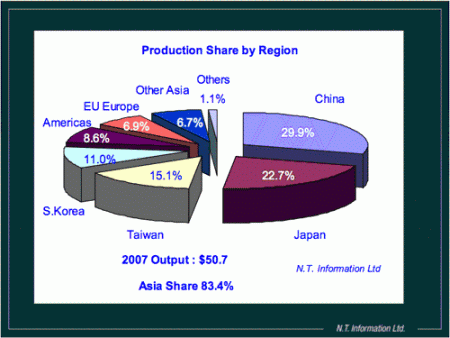Asia is better off than the West - but it's still in trouble
The West, having lived beyond its means for so long, is cutting back and repairing its balance sheets. Asian economies will no longer be able to rely on exports, says Chris Sholto Heaton, so the continent's long-term growth must be driven by domestic demand.

Get the latest financial news, insights and expert analysis from our award-winning MoneyWeek team, to help you understand what really matters when it comes to your finances.
You are now subscribed
Your newsletter sign-up was successful
Want to add more newsletters?

Twice daily
MoneyWeek
Get the latest financial news, insights and expert analysis from our award-winning MoneyWeek team, to help you understand what really matters when it comes to your finances.

Four times a week
Look After My Bills
Sign up to our free money-saving newsletter, filled with the latest news and expert advice to help you find the best tips and deals for managing your bills. Start saving today!
"Structural versus cyclical" is the new "decoupling". Over the last couple of weeks, I've talked to a few fund managers and read several trees' worth of analysts' predictions for 2009 and that phrase has been jumping out at me again and again.
The argument is simple. America, Britain and the rest of the over-consuming West have a serious structural problem. They've lived beyond their means for too long. Now they need to cut back and repair their battered balance sheets.
Emerging markets are different. They didn't flash the plastic with the same abandon. Savings rates are generally high and debt levels low. They're experiencing a normal cyclical recession, not the drawn-out adjustment the developed world must expect.
MoneyWeek
Subscribe to MoneyWeek today and get your first six magazine issues absolutely FREE

Sign up to Money Morning
Don't miss the latest investment and personal finances news, market analysis, plus money-saving tips with our free twice-daily newsletter
Don't miss the latest investment and personal finances news, market analysis, plus money-saving tips with our free twice-daily newsletter
I don't disagree with all of that. Asia's low debt load is one of the main reasons I'm optimistic about its prospects. But I think the "structural versus cyclical" argument is too simplified - and anyone who takes it too seriously will be disappointed...
The bubble in trade
Take a look at the chart below, which shows Korea and Taiwan's monthly exports over the last five years.

This chart comes from Brad Setser of the Council on Foreign Relations, an American think tank. As he puts it: "These look a lot like charts of financial variables after a bubble bursts, not charts of the level of exports. That isn't good."
I think Setser is probably right. We have a bursting semi-bubble in exports, which is tied to the bursting credit bubble.
From credit to exports
Exports and credit are connected in at least two obvious ways. One is trade finance: the guarantees and loans that allow goods to be shipped around the world. Unfortunately, banks have become more reluctant to extend this finance as a result of the credit crunch (we discussed more on trade finance in a recent issue of MoneyWeek: Is international trade grinding to a halt? If you're not already a subscriber to MoneyWeek, subscribe to MoneyWeek magazine).
Some analysts blame much of the collapse in trade on this, not a lack of demand. They argue that once credit comes back, so will trade. I'm not convinced by this argument, because there's an obvious alternative.
We know that the West has been overconsuming, made possible by easy credit. With that credit drying up and consumers cutting back, so consumption is plunging and so are Asian exports.
One thing to note is that Taiwanese and Korean exports have dropped much more than China. A couple of factors are probably responsible. First, many goods are exported to China for processing, so the collapse shows up earlier in these countries. This suggests Chinese exports will drop further in the next couple of months.
Second, China is moving up the value chain. Many things that were previously imported for processing are increasingly being made locally. This secular shift could well be making the cyclical demand-driven drop worse for other Asian countries. (Of course, China is also losing customers for goods further down the chain, such as textiles and toys, to cheaper Vietnam and probably to India and Cambodia in the future.)
Asia's model is broken
Some countries will do worse than others, but overall Asia's exports are going to be cut by the burst credit bubble and by far more than I expected nine months ago, since the autumn credit market implosion was far worse than I feared. An easing in trade finance could make things a bit better but a lot of demand is going to be wiped out for good.
Now, I don't think it's all bad news. Asia is still the low-cost exporter and could steal a bigger share of a shrinking and even more cost-conscious market. In the past, I've suggested that Asia could lose out to other countries that are closer to Western consumers because of spiralling transport costs, and I believe that will be true when energy costs rise again.
But with crude having fallen far more than I expected and container shipping rates plummeting because of oversupply (see chart below), that shift is fading into future again.

Still, even if Asia increases market share, exports are going to fall outright. So Asia's long-term growth must come from domestic demand as was always going to be necessary. The export-driven model is now broken.
But despite the hopes of many investors and analysts, domestic demand will not surge overnight, especially at a time of stress. The freer-spending Asian consumer is a long-term, secular shift in attitudes. For now, Asia will be depending on government spending to support it through the tough year ahead.
Buy surplus and capital, avoid deficits and debt
This is why I am focusing more on countries such as China, which have scope for this, than ones such as India, which are more constrained by the government budget deficit and the availability of credit. Long-term, I'm very excited by India's prospects but most of my preferred ways to play these still look as if they could fall much further over the next few months.
China has plenty of problems. The economy is unbalanced towards exports and investment, and changing this will not be quick or easy. Social unrest is rising as the economy worsens and people lose their jobs and this will get worse. However, the experience of the late 1990s, when around 35 million people were laid off as state-owned firms slimmed down, suggests this will be manageable, especially given that the government is now in a stronger fiscal position to help support the unemployed.
The Chinese economy is going to be very weak this year - growth in the last quarter was close to zero (see below for more on this). But it should start to stabilise in the second half as the effect of government stimulus and looser credit feeds in.
The US stimulus package should also be helpful to Asian exporters. The investment programme is likely to contain substantial Buy American' provisions, but if the spending spree manages to stop US domestic demand from freefalling, that will benefit the rest of the world.
But even when the global economy recovers, Asia cannot return to previous growth rates. Western consumers need to pay down debt and so the old engine of export demand will slow. Domestic demand will rise, but only gradually. And credit and investment finance will be tighter. Asia's long-term trend growth will still be high but it will be lower than the bubble-assisted rates of the last five years.
Protectionism is the big risk
There are risks to this scenario. I think China can manage the social unrest without a crisis, but it's impossible to be sure. Alternatively, another global threat on top of this financial panic such as a flu pandemic would set back recovery, perhaps for years. Things such as these are ever-present risks in any market. There's little investors can do except be diversified and always hold some ultrasafe assets.
But as I've noted before, the clearcut risk is protectionism, which could see global trade already fragile collapse 1930s-style.
In this context, the statement by new US treasury secretary Timothy Geithner that "China is manipulating its currency" wasn't reassuring regarding the attitude the Obama administration may take on trade. But the rest of his testimony sounded more pragmatic. "The question is how and when to broach the subject in order to do more good than harm," he said, adding that "the immediate goal should be for us to convince China to adopt a more aggressive stimulus package as we do our part to try to pass a stimulus package here at home".
We'll see more protectionist moves around the world over the next year and the outcome will hurt some Asian exporters. But for now, the outlook is not too dark for the world as a whole although this needs to be watched closely.
Updates on Ezra and Kingboard
A brief update on a couple of our stocks. Singapore shipyard Keppel has confirmed that our offshore oil services firm Ezra Holdings (SIN:5DN)is cancelling the new multi-functional support vessels (MFSVs) it has on order. It also looks increasingly likely that Ezra will cancel two MFSV orders with Norway's Karmasund yard, leaving it with two on order from another Singaporean yard. This looks like the right move: firms that cut back on capital expenditure quickly once cyclical industries turn down usually fare best.
Meanwhile, ratings agency Standard & Poor's has put Kingboard Chemical Holdings (HKG:0148) on review for possible downgrade (it's rated BBB-, which is the bottom end of investment grade). That's no surprise: chemicals firms are being downgraded across the board and a sharp drop in Kingboard's profitability this year is certain (which is the reason for the S&P review).
More significantly, the analyst commented: "Given Kingboard Chemical's leading market positions in the laminate and PCB sectors, we believe the company will be better placed than its peers as the weakness in the end-product market persists The company's flexibility to curtail capital expenditure should help it to maintain its moderate financial leverage amid weakening profitability." I think this relative strength could allow Kingboard to snap up distressed peers and assets and emerge stronger from the downturn.
Given my comments about protectionism above, you may wonder if Kingboard is vulnerable. I believe not: this was one reason I picked the firm as a value play. As you can see below, Asia dominates circuit board production and I can't see this industry as a winner from a bring the jobs back home' move in the West, since adding replacement capacity here would be so expensive.

Turning to the markets...
TABLE.ben-table TABLE {BORDER-RIGHT: #2b1083 3px solid; BORDER-TOP: #2b1083 3px solid; FONT: 0.92em/1.23em verdana, arial, sans-serif; BORDER-LEFT: #2b1083 3px solid; BORDER-BOTTOM: #2b1083 3px solid}TH {PADDING-RIGHT: 5px; PADDING-LEFT: 5px; FONT-WEIGHT: bold; BACKGROUND: #2b1083; PADDING-BOTTOM: 10px; BORDER-LEFT: #a6a6c9 1px solid; COLOR: white; PADDING-TOP: 10px; TEXT-ALIGN: center}TH.first {PADDING-RIGHT: 2px; PADDING-LEFT: 2px; PADDING-BOTTOM: 5px; BORDER-LEFT: 0px; PADDING-TOP: 5px; TEXT-ALIGN: left}TR {BACKGROUND: #fff}TR.alt {BACKGROUND: #f6f5f9}TD {PADDING-RIGHT: 2px; PADDING-LEFT: 2px; PADDING-BOTTOM: 5px; BORDER-LEFT: #a6a6c9 1px solid; COLOR: #000; PADDING-TOP: 5px; TEXT-ALIGN: center}TD.alt {BACKGROUND-COLOR: #f6f5f9}TD.bold {FONT-WEIGHT: bold}TD.first {BORDER-LEFT: 0px; TEXT-ALIGN: left}
| China (CSI 300) | 2033 | +2.1% |
| Hong Kong (Hang Seng) | 12,579 | -5.1% |
| India (Sensex) | 8,674 | -7.0% |
| Indonesia (JCI) | 1,316 | -3.5% |
| Japan (Topix) | 774 | -5.4% |
| Malaysia (KLCI) | 873 | -2.7% |
| Philippines (PSEi) | 1,857 | -4.8% |
| Singapore (Straits Times) | 1,685 | -2.6% |
| South Korea (KOSPI) | 1,093 | -3.7% |
| Taiwan (Taiex) | 4,248 | -2.4% |
| Thailand (SET) | 434 | -0.4% |
| Vietnam (VN Index) | 302 | -1.0% |
| MSCI Asia | 74 | -4.6% |
| MSCI Asia ex-Japan | 259 | -4.9% |
There was little good news in Asian markets last week. Equities slid, while improvements in credit halted. The JP Morgan Asia Credit Index, which measures the spread between the yield on a basket of Asian bonds and the yield on US Treasuries, was almost unchanged at 585 basis points for investment grade debt and 904 basis points for riskier debt. Both are more than twice as high as they were six months ago.
Economic news was grim, though not unexpected. China reported fourth quarter GDP growth of 6.8%; however, unlike most countries China measures GDP on a year-on-year basis. On a quarter-on-quarter seasonally adjusted and annualized basis, growth was probably close to zero.
Korean GDP which is reported on a seasonally adjusted quarter-on-quarter, but not annualised contracted by 5.6%, the biggest drop since the Asian crisis in 1997-1998. In addition to plunging exports, the domestic economy is very weak, with private consumption falling 4.8%.
Tata Steel was the biggest faller in India's Sensex exchange, down 20% over the week after ratings agency Moody's cut the credit rating of its UK unit (formerly known as Corus) and put the overall group rating on review. In Hong Kong, global retail supply chain manager Li & Fung rose 19% on speculation that the Obama administration's plans will lead to a recovery in US consumer demand.
This article is from MoneyWeek Asia, a free weekly email of investment ideas and news every Monday from MoneyWeek magazine, covering the world's fastest-developing and most exciting region. Sign up to MoneyWeek Asia here.
Get the latest financial news, insights and expert analysis from our award-winning MoneyWeek team, to help you understand what really matters when it comes to your finances.

Cris Sholt Heaton is the contributing editor for MoneyWeek.
He is an investment analyst and writer who has been contributing to MoneyWeek since 2006 and was managing editor of the magazine between 2016 and 2018. He is experienced in covering international investing, believing many investors still focus too much on their home markets and that it pays to take advantage of all the opportunities the world offers.
He often writes about Asian equities, international income and global asset allocation.
-
 Early signs of the AI apocalypse?
Early signs of the AI apocalypse?Uncertainty is rife as investors question what the impact of AI will be.
-
 Reach for the stars to boost Britain's space industry
Reach for the stars to boost Britain's space industryopinion We can’t afford to neglect Britain's space industry. Unfortunately, the government is taking completely the wrong approach, says Matthew Lynn